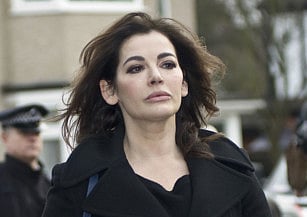Nigella Lawson in new police drug inquiry
In the witness box, Lawson admitted taking cocaine several times, most recently in 2010, and smoking cannabis

Nigella Lawson is facing a police investigation into her admission that she used drugs after a dramatic about turn by Scotland Yard on Saturday.
Police are to carry out a review of evidence she gave during the fraud trial of Francesca and Elisabetta Grillo, her former personal assistants.
In the witness box, she admitted taking cocaine several times, most recently in 2010, and smoking cannabis. However, evidence was also given by the two women claiming she had repeatedly used the Class A drug. When they were acquitted on Friday, Scotland Yard said it would not look at her admissions or the women’s claims. She would only be investigated if new evidence emerged.
But on Saturday night Commander Stephen Watson, of the Metropolitan Police, told The Sunday Telegraph that officers would examine the “implications” of what she had said under oath and seek advice on what to do next from the Crown Prosecution Service. Police will consider whether to bring drug possession charges and could also interview her to attempt to identify her suppliers. Social services could also intervene either at the request of police or on their own initiative after claims that she used drugs in front of her children.
The developments came amid mounting anger from Lawson and her supporters over what they see as a determined campaign to smear her and damage her career after the collapse of her marriage to Charles Saatchi, the art dealer.
The Sunday Telegraph has established fresh details of his role in the campaign, including how Saatchi and the Grillo sisters used the same public relations representative. In spite of the Grillo sisters being prosecuted for defrauding Saatchi he is understood to have used Richard Hillgrove to plant stories about his ex-wife. The adviser was also being used by the Grillos. Friends said last night that Lawson was furious about how allegations of her drug use had emerged. However, Lawson’s supporters also made clear that she was pressing ahead with her work. Saatchi was understood to have left the country for a holiday in the Caribbean.
On Friday, Scotland Yard issued a statement that said: “At this stage the Metropolitan Police will not be investigating these allegations.” But Watson said: “Frankly, I don’t think the full colour of the Metropolitan Police Service’s position was conveyed in that statement.” Scotland Yard’s new review is likely to focus on evidence Lawson gave at Isleworth Crown Court on December 4. Lawson disclosed that she took the Class A drug on six occasions with John Diamond, her first husband, when he found out that he had terminal cancer. “It gave him some escape,” she told the court. “There was another time I took cocaine. In July 2010 I was having a very, very difficult time. I felt subjected to intimate terrorism by Mr Saatchi.” She added: “The idea that I am a drug addict or habitual user of cocaine is absolutely ridiculous.”
Lawson also admitted taking cannabis in the last year of her marriage to the multi-millionaire art gallery owner. “I have to be honest, I have smoked the odd joint,” she said. “I found it made an intolerable situation tolerable. It’s a false friend. I found the answer was in changing the situation and trying to create a tolerable situation for me and my family. Since freeing myself from a brilliant but brutal man, I’m now totally cannabis, cocaine and drug free.” She claimed in her evidence that Saatchi had “told everyone” he was taking cocaine out of her nose after he was photographed holding her neck at Scott’s restaurant in central London. She said the incident was provoked by another, unrelated comment.
However, legal experts and police officers said pursuing a case against Lawson presented several difficulties. Prof David Nutt, the former government adviser on drugs laws, said: “The law in this country is based on possession of drugs, not on their use. The police would not be able to prove it.” Sally O’Neill QC, a criminal barrister from Furnival Chambers, said: “If someone does incriminate themselves giving evidence as a witness it would be highly unusual for them to be prosecuted.”
Sign up for the Daily Briefing
Get the latest news and updates straight to your inbox
Network Links
GN StoreDownload our app
© Al Nisr Publishing LLC 2026. All rights reserved.